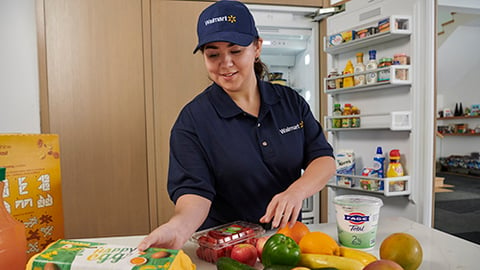America’s Biggest Retailer Cuts Profit Outlook Amid Rising Food Prices
Walmart Inc. is in the midst of trying to balance the needs of customers with the need to deliver profit growth during this inflationary period. The retail giant provided a business update on July 25, revising its profit outlook for the second quarter and full fiscal year, primarily due to pricing actions aimed at improving inventory levels at Walmart and Sam’s Club in the United States and its mix of sales.
Comp sales for Walmart U.S., excluding fuel, are expected to be about 6% for the second quarter. This is higher than previously expected, with a heavier mix of food and consumables, which is negatively affecting its gross margin rate.
With the latest Consumer Price Index for food 12.2% higher than this time last year, shoppers’ ability to spend on general merchandise categories is being negatively affected. According to Walmart, this requires more markdowns to move through the inventory, particularly apparel.
“The increasing levels of food and fuel inflation are affecting how customers spend, and while we’ve made good progress clearing hardline categories, apparel in Walmart U.S. is requiring more markdown dollars. We’re now anticipating more pressure on general merchandise in the back half; however, we’re encouraged by the start we’re seeing on school supplies in Walmart U.S.,” said Doug McMillon, Walmart Inc. president and CEO.
During its first quarter, the company indeed made progress reducing inventory, managing prices to reflect certain supply chain costs and inflation, and reducing storage costs associated with a backlog of shipping containers. Customers choose Walmart to save money, which is reflected in the company’s continued market share gains in grocery. However, Q1 growth was negatively affected by $5.0 billion because of divestitures, and $0.4 billion from currency, according to the company. Consolidated operating expenses as a percentage of net sales rose 45 basis points.
“Bottom-line results were unexpected and reflect the unusual environment. U.S. inflation levels, particularly in food and fuel, created more pressure on margin mix and operating costs than we expected,” said McMillion in May, at the time of the Q1 earnings report release.
Based on the current environment and the company’s outlook for the remainder of the year, it’s providing the following updates to its guidance:
- Consolidated net sales growth for the second quarter and full year is expected to be about 7.5% and 4.5%, respectively. Excluding divestitures, consolidated net sales growth for the full year is expected to be about 5.5%.
- Net sales include a headwind from currency of about $1 billion in the second quarter. Based on current exchange rates, the company expects a $1.8 billion headwind in the second half of the year.
- The company maintains its expectations for Walmart U.S. comp- sales growth, excluding fuel, of about 3% in the back half of the year.
- Operating income for the second quarter and full year is expected to decline 13% to 14% and 11% to 13%, respectively. Excluding divestitures, operating income for the full year is expected to decline 10% to 12%.
- Adjusted earnings per share for the second quarter and full year is expected to decline around 8% to 9% and 11 to 13%, respectively. Excluding divestitures, adjusted earnings per share for the full year is expected to decline 10% to 12%.
According to CNBC, Walmart’s stock fell by more than 9% in after-hours trading following the lower-profit outlook announcement. Shares of other retailers, including Target and Amazon, also fell. Target was down by more than 6%, while Amazon fell by more than 3%.
Walmart will provide further details on business performance and its outlook for the year when it reports second-quarter results on Aug. 16.
Each week, approximately 230 million customers and members visit Walmart’s more than 10,500 stores and numerous e-commerce websites under 46 banners in 24 countries. With fiscal year 2022 revenue of $573 billion, the company employs approximately 2.3 million associates worldwide. Bentonville, Ark.-based Walmart U.S. is No. 1 on The PG 100, Progressive Grocer’s 2022 list of the top food and consumables retailers in North America, while Sam’s Club ranks eighth.






